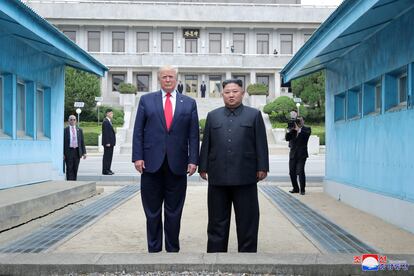North Korea says Travis King crossed border seeking refuge from ‘racial discrimination within the US Army’
The 23-year-old private is believed to be the first American soldier to enter the secretive dictatorship since 1982 after crossing the DMZ while on a civilian tour

North Korea has provided the first official confirmation that U.S. Army soldier Travis King had crossed the Demilitarized Zone (DMZ) into its territory on July 18. The North Korean Central News Agency, KCNA, reported Wednesday that King “confessed” to “illegally entering” the country because he “harbored ill feelings against inhuman mistreatment and racial discrimination within the U.S. Army.” According to the KCNA agency statement, the 23-year-old private expressed his willingness to seek refuge in North Korea or a third country, stating he “was disillusioned at the unequal American society.” The U.S. Department of Defense has not been able to independently verify the report.
King’s mother, Claudine Gates, has asked the North Korean government to treat her son “humanely,” according to CNN. “Ms. Gates is aware of today’s ‘report’ from KCNA. DPRK authorities are responsible for Travis King’s well-being, and she continues to appeal to them to treat him humanely. She’s a mom worried about her son and would be grateful for a phone call from him,” said Jonathan Franks, a spokesman for the family.
For its part, the Pentagon has stated that Washington is focused on King’s safe return. “The Department’s priority is to bring Private King home, and that we are working through all available channels to achieve that outcome,” a U.S. defense official stated. It is unclear whether Washington has received any further details from North Korea. So far, officials quoted by U.S. media said Pyongyang had not provided substantive responses to their requests for information about King. A spokesman for the United Nations Command, which oversees the border village of Panmunjom where King crossed, said he had nothing to add to previous statements.
North Korea and South Korea — and its ally in the 1950-1953 conflict, the United States — remain technically at war, having signed an armistice rather than a peace treaty. As an active-duty soldier, King could be considered a prisoner of war, but factors such as his decision to cross into North Korea of his own volition and in civilian clothes disqualify him from that designated, Reuters reported U.S. military officials as saying.
It is unclear why on July 18 King decided to become the first U.S. soldier to cross into North Korea since 1982, also becoming the first American to be detained in the country in five years. King enlisted in the U.S. Army in January 2021 and was stationed in South Korea, where the U.S. maintains a deployment of 28,500 troops, 70 years after the end of the Korean War. But his posting had been marked by various run-ins with the law. He was found guilty of assault and damage to public property during an altercation in October, Reuters reported. Fined by a South Korean court, he spent 50 days in detention and was released on July 10. King’s uncle, Myron Gates, told ABC News in early August that his nephew had experienced racism during his military deployment and, after spending time in a South Korean jail, did not seem the same.
After being released, his superiors ordered King to return to his home base in the U.S. to face a disciplinary hearing. On July 17, King confirmed that he was ready to board a Dallas-bound American Airlines plane that would take him back to his unit, the 1st Cavalry Regiment of the 1st Armored Division, at Fort Bliss, Texas. However, the military escort who accompanied him to Incheon International Airport in Seoul only took him as far as passport control, beyond which they were not authorized to continue.
King cleared customs and all security checks, airport officials told the press, but at the gate, the soldier informed airline personnel that his passport was missing and did not board the plane. Airline workers escorted him back outside the departure area.
King then booked a tour with a private company to the DMZ for the following day, the only point on the 160-mile-long, 1.2-mile-wide fortified border where there is no barbed wire or landmines. It is also the only place where contact, be it public or secret, between the two Koreas is allowed. It was while visiting with 42 other tourists that King inexplicably fled across the Military Demarcation Line, witnesses told the media and U.S. officials familiar with the incident later confirmed.

No American, detainee or defector, had ever crossed into North Korea there before, even though it only entails stepping over a small brick line, as Donald Trump did in 2019, when he became the first U.S. president to set foot on the territory of one of the most secretive dictatorships on the planet.
After crossing the DMZ, King tried to enter Panmungak Hall, a North Korean facility, but the front door was locked, so he ran to the back of the building, at which point North Korean guards took him prisoner.
Sign up for our weekly newsletter to get more English-language news coverage from EL PAÍS USA Edition
Tu suscripción se está usando en otro dispositivo
¿Quieres añadir otro usuario a tu suscripción?
Si continúas leyendo en este dispositivo, no se podrá leer en el otro.
FlechaTu suscripción se está usando en otro dispositivo y solo puedes acceder a EL PAÍS desde un dispositivo a la vez.
Si quieres compartir tu cuenta, cambia tu suscripción a la modalidad Premium, así podrás añadir otro usuario. Cada uno accederá con su propia cuenta de email, lo que os permitirá personalizar vuestra experiencia en EL PAÍS.
¿Tienes una suscripción de empresa? Accede aquí para contratar más cuentas.
En el caso de no saber quién está usando tu cuenta, te recomendamos cambiar tu contraseña aquí.
Si decides continuar compartiendo tu cuenta, este mensaje se mostrará en tu dispositivo y en el de la otra persona que está usando tu cuenta de forma indefinida, afectando a tu experiencia de lectura. Puedes consultar aquí los términos y condiciones de la suscripción digital.









































